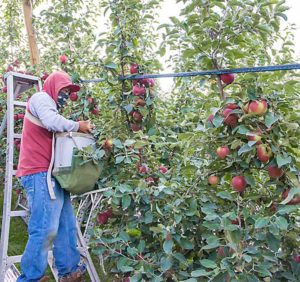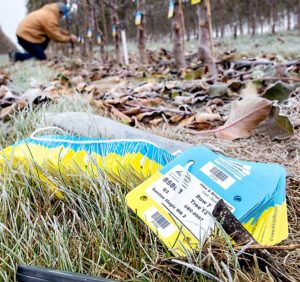Managers of the commercialization of the WA 38, the Washington State University apple marketed as Cosmic Crisp, reported growth in domestic sales, European-grown apples reaching market for the first time and continued royalties for the university in a Feb. 9 webinar.
Caretakers of the apple shared general stats about plantings, production and international growth to a lively, if virtual, crowd that sent in 61 questions, more than the panelists could answer live.
Here are a few of the highlights:
—After spiking in 2018, tree plantings have steadily declined, said Kevin Brandt, vice president of Proprietary Variety Management, or PVM, the Yakima, Washington, company hired by WSU to manage the apple. PVM expects about 2.5 million new WA 38 trees this year, including planted trees and grafted trees, for a total of 14.1 million. Geneva 41 will be the most common rootstock, followed by two clones of Malling 9 and G.935.
—In 2021, Washington companies expect to ship about 1.6 million 40-pound box equivalents of Cosmic Crisp apples, said Jill Burbery , communications and operations director of PVM. The number of companies packing the apple has about doubled to 37, while 17 sales firms, almost all of them in Washington state, now market the Cosmic Crisp.
—Shipments as of Jan. 31 were 550,000 boxes, which is slower than industry targets, Burbery said. However, most high-priced apples have experienced slower than anticipated sales this year, possibly due to the pandemic’s disruption of consumer shopping habits.
—Royalties have been rolling in at $1 per tree. WSU’s portion of that added up to $8.9 million at the end of 2020. Fruit production royalties, at 4.75 percent per box for the 2019–2020 sales year, were about $857,000. The current crop year royalties won’t be tallied until August, said Scot Hulbert, WSU associate dean of research.
—WSU has reinvested $1.8 million of the royalties into the pomology breeding program, from collections in 2017, 2018 and 2019.
—Though Washington growers have exclusive North American rights for 10 years, PVM is continuing to license producers and marketers overseas as a way to protect intellectual property in the global arena, said Lynnell Brandt, president and CEO of PVM. So far, the European Union, New Zealand, Argentina and Russia planted trees before 2021. Australia and Chile were expected to start planting this year.
—PVM has secured or is in the process of securing trademark protection in 42 different countries.
—Europe will be the first place after Washington to bring apples to the market, with about 19,000 boxes expected in 2021. That is expected to jump to 2.9 million by 2028.
—by Ross Courtney








Leave A Comment